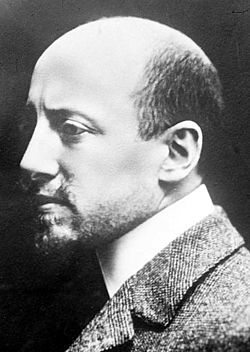Draft:Gabriele D'Annunzio
| Suppress the dissenters Fascism |
| Bundle of rods |
| Fascists |
| Groups |
Gabriele D'Annunzio, Prince of Montenevoso (March 12, 1863 - March 1, 1938) was an Italian author, celebrity, nobleman and a dictator of a short-lived breakaway state. As a writer, he was primarily known as the main representative of the Italian decadentism![]() , with his novel Il Piacere
, with his novel Il Piacere![]() being a landmark of the Fin de siècle-era
being a landmark of the Fin de siècle-era![]() literature. Despite his reputation as kind of a "dandy", he would go on to fight in the First World War for the Royal Italian Army and emerge from it as a celebrated war hero and in 1924, d'Annuzio would be ennobled and given the title Principe di Montenevoso (Prince of Montenevoso).
literature. Despite his reputation as kind of a "dandy", he would go on to fight in the First World War for the Royal Italian Army and emerge from it as a celebrated war hero and in 1924, d'Annuzio would be ennobled and given the title Principe di Montenevoso (Prince of Montenevoso).
In the early 1920s, he started pursuing politics and - by combining his ideals of decadent movement aestheticism![]() and Nietzschean vitalism - he is regarded as one of the notable representatives of proto-fascism in Italy. Notably, in 1919, he declared himself "Il Duce" of a short-lived corporatist city-state dictatorship known as Italian Regency of Carnaro,
and Nietzschean vitalism - he is regarded as one of the notable representatives of proto-fascism in Italy. Notably, in 1919, he declared himself "Il Duce" of a short-lived corporatist city-state dictatorship known as Italian Regency of Carnaro,![]() which the other "Il Duce" would use as template for his reign in Fascist Italy.
which the other "Il Duce" would use as template for his reign in Fascist Italy.
